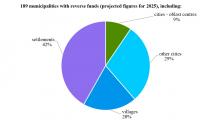Oksana Prodan, Advisor to the Chair of the Association of Ukrainian Cities, Member of Parliament of the 7th and 8th Convocations.
The most acute and complicated issue for local self-government and central government in State Budget 2025 is the reverse subsidy to municipalities. What does it involve and why has this topic caused such a stir in society?
In a very simplified way, reverse subsidy is the withdrawal of funds from municipalities and their transfer to the central budget.
Until 2014, the Budget Code did not contain such a subsidy, but rather the term ‘withdrawal’. As part of the decentralisation reform, a unique Ukrainian know-how emerged — a reverse subsidy. It looks like a subsidy, but not for municipalities, rather from economically developed municipalities to the state budget. Regardless of the size of the reverse subsidy, the state must provide all municipalities that do not have enough funds to fulfil their powers with a basic subsidy according to a formula defined by law. The state guarantees equal rights and opportunities to all citizens.
It was assumed that upon completion of the decentralisation reform, the reverse transfer would be replaced by a vertical fund for equalising the financial capacity of municipalities, formed according to European standards. The fundings would be distributed directly, without intermediaries (ministries, district state administrations, regional state administrations), based on a per capita formula to municipalities in need to ensure the same quality of public services for Ukrainians regardless of their place of residence. However, as it is always the case in our country, a temporary instrument has become permanent. From 2015 to 2021, funds were honestly taken from the budgets of municipalities to the State Budget of Ukraine and the same honest promise was made to improve the quality of services to all Ukrainians. Municipalities quietly complained about this, relevant draft laws were submitted, roundtables and discussions were held, grants were used...
With the outbreak of a large-scale war, on 24 February 2022, the government stopped withdrawing reverse subsidy funds from the state budget. These funds were left automatically to municipal authorities, when there was no politics, but rather recognition of the importance of municipalities in the fight against the aggressor. The reverse allows municipalities to finance education and healthcare, heat and water supply, and infrastructure used by all other surrounding municipalities. Today, after the ‘military’ and ‘security’ personal income tax is withdrawn from municipalities, the reverse is the source of funding for the joint forces of the Armed Forces of Ukraine - fast and targeted.
Unfortunately, in the third year of war in Ukraine, the idea of resuming the withdrawal of reverse funds from municipalities arose, and the Government submitted the relevant provisions to the draft State Budget 2025. A fierce debate ensued: should UAH 12.9 billion be withdrawn from 189 municipalities, 172 of which are small?
Some Members of Parliament have even used the russian guidelines of the Party of Regions and started classifying municipalities in their public speeches into sorts - poor and rich, East and West...
On 31 October, the Parliament of Ukraine adopted a ‘Solomon's judgement’ when voting on the State Budget 2025 in the first reading, in paragraph 2.30 of the Budget Conclusions, instructing the Government to decide on the feasibility of withdrawing reverse funds from municipalities before the second reading.
However, on 8 November, the government submitted a draft state budget to the Parliament without any changes to the reverse transfer provisions. The debate flared up again, and the Budget Committee failed to convince the Ministry of Finance - only 11 votes were cast in favour of keeping the reverse transfer funds in the budgets of municipalities.
Therefore, the issue is now open and still relevant.
The reverse funds should be left in the budgets of municipalities for the following reasons.
Firstly, these funds are used to control tariffs for heat and water supply, and in some municipalities, they are used to provide the services at all. The majority of consumers of these services are Ukrainian citizens, especially in the reverse municipalities. Electricity costs have doubled during the war, and the relevant enterprises will simply not be able to provide services to residents without support from local budgets.
Secondly, these are funds to eliminate the consequences of russian missile attacks. Odesa, Dnipro, Pavlohrad, Nikopol and Lviv must have the funds to quickly restore critical infrastructure and resettle the affected residents. Sunday's shelling showed that even the municipalities of Zakarpattia and Prykarpattia need funds to respond to the situation urgently.
Thirdly, these funds are to provide for IDPs, a huge number of whom have moved to the western and central regions and are now living in reverse municipalities. These municipalities need to be allocated funds not only for their maintenance, but also for housing for IDPs so that they do not return to the temporarily occupied territories.
Fourthly, it is support for de-occupied municipalities - 35 out of 69 municipalities in Kyiv region are reverse municipalities. Apart from these funds, they have nothing left to rebuild their infrastructure so that their residents feel safe.
Fifthly, the reverse funds in the municipalities are people's money that is used to support veterans and rehabilitate military personnel in these municipalities.
Sixthly, the reverse is applicable to municipalities that have systematically and powerfully stimulated economic and business development. This is a complete demotivation of these municipalities and the surrounding ones to create jobs.
Seventhly, there should be municipalities that have not only a ‘critical budget’ for public sector salaries, but also can help their own residents and provide assistance to other municipalities to eliminate the consequences of shelling. In the event of an emergency in one of the municipalities, after the military and security PIT is withdrawn, the reverse funds allow the municipalities to help each other rescue their residents.
Eighthly, and also importantly, leaving the reverse subsidy to 189 municipalities, 150 of which are small, does not affect the basic subsidy for the remaining 800 municipalities. The basic subsidy indicator does not depend on the amount of the reverse subsidy withdrawn/not withdrawn. It depends solely on the tax capacity index, which is calculated in the same way for all budgets. Moreover, the basic subsidy has been reduced after the removal of the military PIT and will be further reduced if the reverse subsidy is removed, as the ‘unit’ becomes cheaper in the formula.
Ninthly, if the reverse of municipalities is withdrawn, the support of our international partners will decrease. They are already cautious about such initiatives. And if we continue to promote the idea that there are rich municipalities in Ukraine, their governments will not be able to explain to an average American, German, French, etc. why they need to help Ukraine.
These are just a few of the arguments that are currently being voiced in the Parliament by some Members of Parliament.
The latest version of the draft State Budget-2025 approved by the Committee, the above arguments, and the open position of mayors to retain reverse funds even in neighbouring cities and villages prove that the withdrawal of reverse funds from the budgets of municipalities will weaken local self-government, reduce the ability to provide for local residents, and withdraw funds from military units, thus playing into the hands of the aggressor, and is necessary not for Ukraine but for russia.
The final decision to keep the reverse subsidy funds in the budgets of municipalities will be made by the Verkhovna Rada of Ukraine this week, possibly even tomorrow. The whole of Ukraine is waiting to see if the government will leave the money to the people?













